Seton Hall
Is "defense wins championships" true?
Date: August 2, 2020By: Joe Cammarota

AZ Quotes
The famous saying from the great coach Paul “Bear” Bryant is “Offense sells tickets. Defense wins Championships.” With the National Football League progressing and evolving since its creation, the rules have been consistently changed to help offenses. With all the rule changes is this saying still true, or does having an elite defense still reign supreme?
This article will focus from the 2010 season and on as it is a clean ten years, and it was the start of seeing additional rules enacted to protect players such as the quarterback and wide receiver. For this piece I will be getting my statistics from Pro Football Reference.
Many teams have good defenses, but in my opinion, for the adage to be proven a team needs to have a top-five defense. Also, it is important to note that statistics do not tell the whole story. A lot happens in an NFL season and individual games can take a totally different look no matter how good a defense or offense is. However, for this article, the determination of proving or disproving the adage will not be based on how well a defense plays in the Super Bowl, but how they rank throughout the season.
In 2010, the two best defenses, according to Pro Football Reference, were the two teams who played in the Super Bowl: the Pittsburgh Steelers at one, and the Green Bay Packers at two. The Steelers only allowed on average 14.5 points-per-game (ppg) while the Packers allowed 15 ppg throughout the season. Both teams’ defenses finished in the top five overall, with the Steelers at two and the Packers at five.
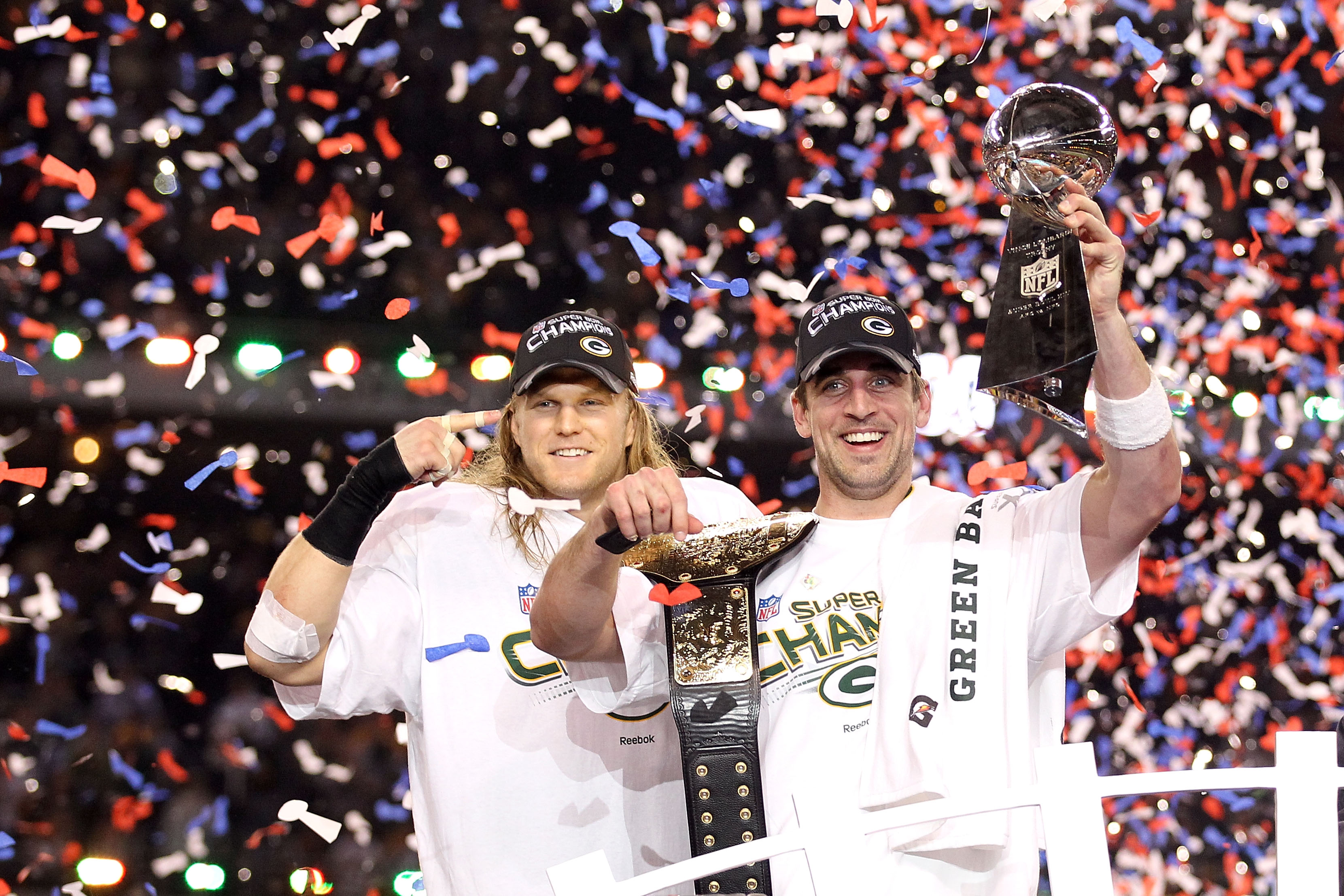
Al Bello/Getty Images
Both teams had great quarterbacks in Ben Roethlisberger and Aaron Rodgers yet of the two teams, the Packers were the team to finish top ten in ppg at 10th by scoring 24.3 ppg, while the Steelers finished 12th with 23.4 ppg. The Packers rode a dominant defense and a good offense to a Super Bowl victory. Although the team with the slightly worse defense won the Super Bowl, the adage rings true as the Packers still had a top five defense which equals elite.
Moving to the 2011 season, as safety rules continued to get implemented, defense took a back seat to the Super Bowl champions. The New York Giants, who defeated the New England Patriots in the Super Bowl, finished 25th in scoring and overall defense. The AFC representative Patriots were 15th in scoring defense and overall defense. Offensively, however, both teams were elite. The Patriots finished third overall and the eventual Super Bowl champions Giants finished ninth. In this season, the adage was proven wrong.
Both teams had good offenses and mediocre/poor defenses, but the team who was worse statistically at both became the champions. Another famous football expression that fits perfectly here is, “On any given Sunday.” The 2011 season and champions statistically do not back up the saying “Defense wins championships.”
In 2012, the Baltimore Ravens won the Super Bowl behind a mediocre defense. That Ravens team was an average team overall. They finished 12th in overall defense and 13th in overall defense, allowing 21.5 ppg. Their opponents in the Super Bowl, the San Francisco 49ers, finished with the second-best defense in the league and had the second-best scoring defense as well, allowing only 17.1 ppg.
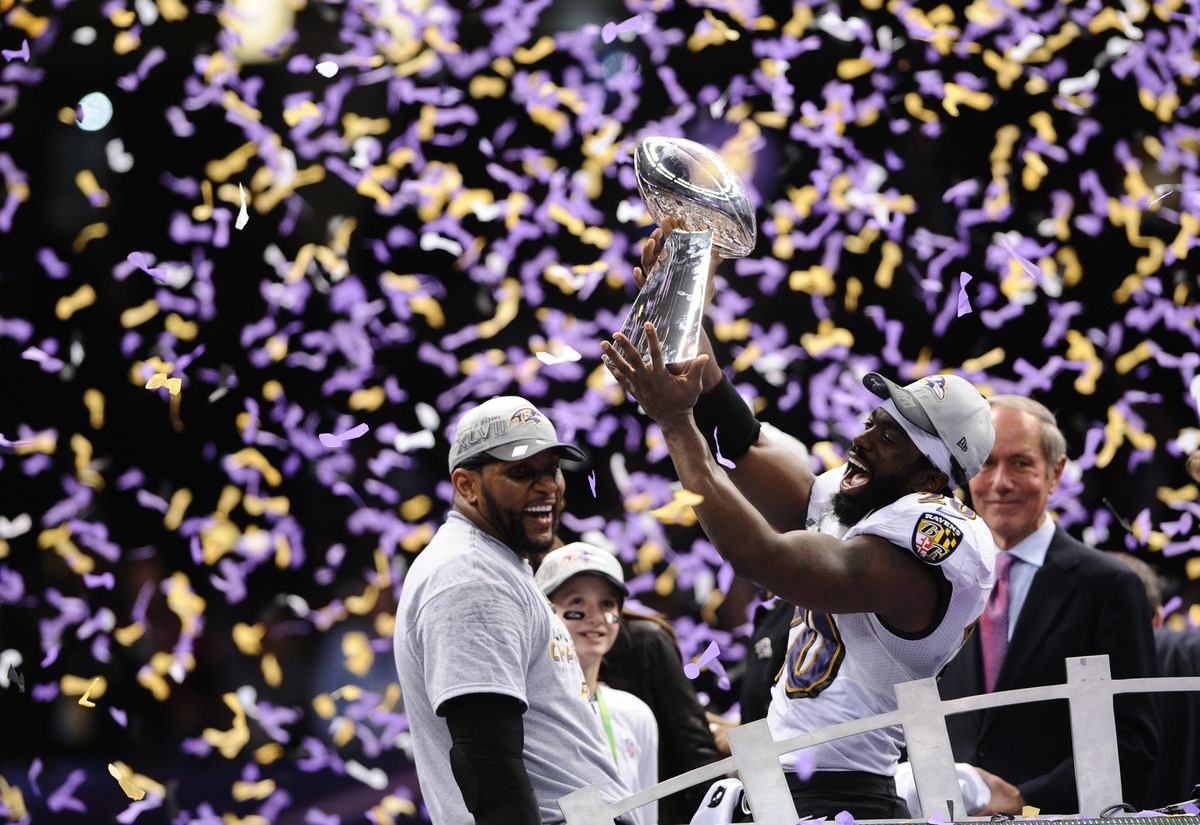
Baltimore Sun
Offensively, both teams were about the same with the Ravens finishing 10th and the 49ers ending the season at 11th. This year had a crazy playoff run by Ravens quarterback Joe Flacco which helped them win a ring for Ray Lewis and Ed Reed. Once again, the adage of “Defense wins championships” was not backed up statistically.
Moving to the 2013 NFL season, the best offense in the league got a chance to prove the saying wrong as they faced off against the best defense in the Super Bowl. The best defense in the league, the Legion of Boom Seattle Seahawks took on the best offense in the league in the high-flying Peyton Manning-led Denver Broncos. The Broncos averaged 37.9 ppg and the Seahawks defense only allowed 14.4 ppg.
When the two met in the Super Bowl, the Seahawks defense suffocated the Broncos in a 43-8 thrashing. The 2013 season confirms the adage of great defenses being more important to a Super Bowl winning team.
In 2014, the Seahawks and the Legion of Boom defense went back to the Super Bowl sporting the best defense in the league. They took on a good defense in the New England Patriots who were eighth in overall defense. Offensively, however, the Patriots finished fourth with a more experienced offense as the Seahawks snuck into the top ten offensively at 10th. The Patriots were victorious in this Super Bowl thanks to a clutch interception at the goal line by Malcolm Butler to seal the game. Although the Patriots had a good defense, they did not have a top 5 defense and were mostly carried by their offense, so this year does not prove the adage correct.
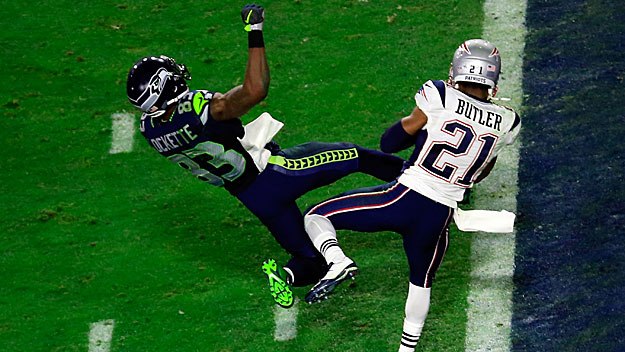
James Squire/Getty Images
In the 2015 season, two teams with elite defenses reached the Super Bowl. However, one of those teams also had the league’s best offense. The Carolina Panthers went into the Super Bowl sporting the best offense in the league. The Cam Newton led Panthers averaged 31.3 ppg while the Broncos, who were in quarterback limbo all season, finished with the 14th best offense and averaged 22.2 ppg.
Defensively, the Broncos were the fourth best team in the league and only allowed 18.5 ppg. The Panthers finished sixth overall and only allowed 19.3 ppg. The Super Bowl went in favor of the Broncos as they shut down the Panthers offense completely and proved the saying that “Defense wins championships” is true.
During the 2016 season, high-flying offenses ran the show. Two out of the top three offenses in the league went to the Super Bowl: the Atlanta Falcons and New England Patriots. The league-best Falcons averaged 33.9 ppg while the third best Patriots averaged 27.6 ppg.
Looking at the defensive side of the football, New England led the league in overall defense. They also allowed the least amount of ppg with 15.6. The Falcons, on the other hand, were awful defensively as they finished 27th in the league overall.
Scoring-wise they were equally as bad as the Falcons were, once again, 27th in the league. They allowed 25.1 ppg. The Patriots won this Super Bowl, as their elite defense shut the Falcons down at the end of the game and gave time for their offense to score enough to win the game. This once again proves the saying that a great defense is more important to a championship side than a great offense.
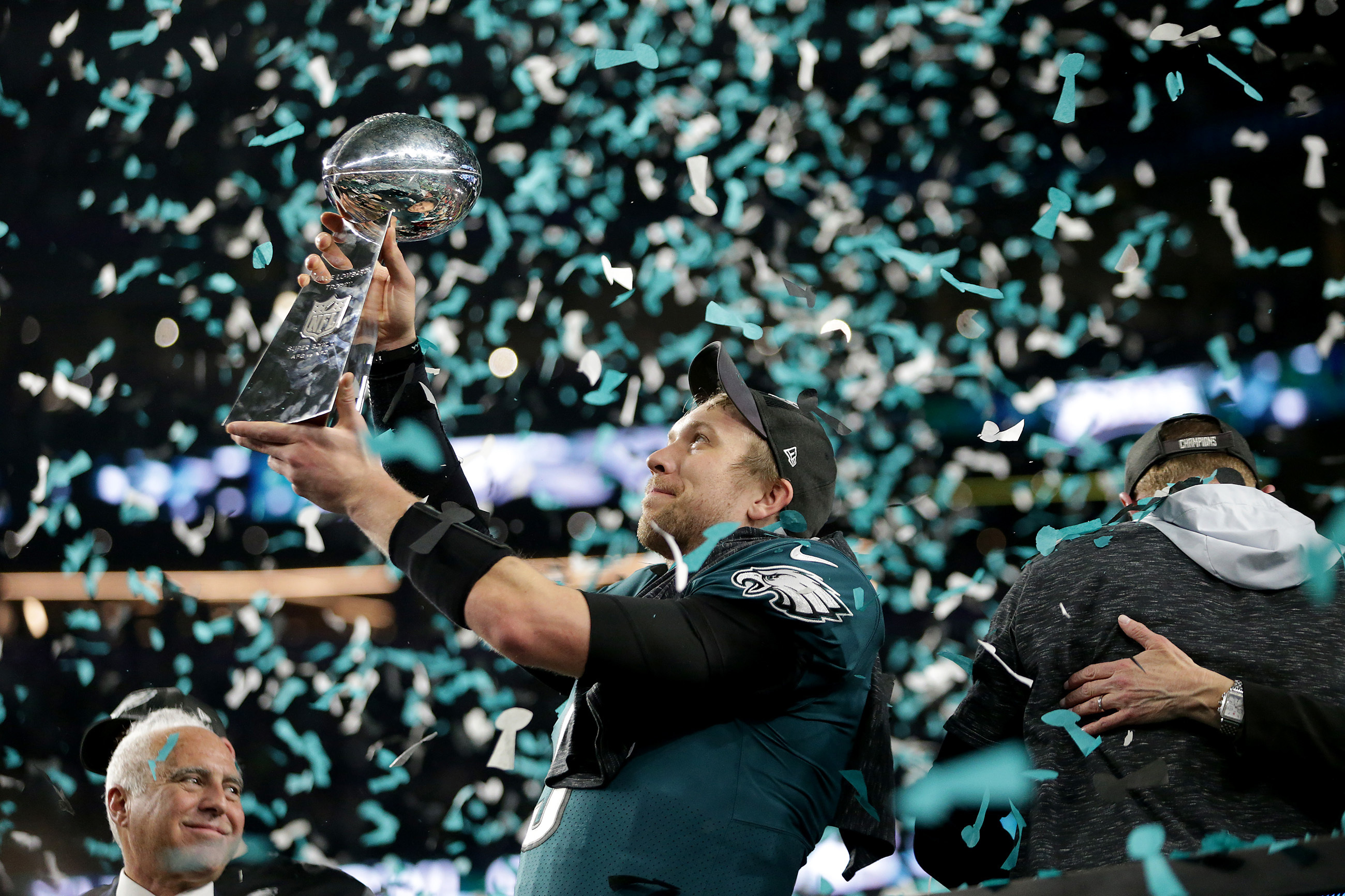
David Maialetti/Philadelphia Inquirer
Going into the 2017 season and the Super Bowl, the Patriots once again were back. They had the fifth best defense in the league overall while only allowing 18.5 ppg. Offensively they were back near the top again with the second-best offense in the league while scoring 28.6 ppg. Interestingly enough, the eventual Super Bowl champion Philadelphia Eagles were almost identical to the Patriots statistically.
Offensively they finished third overall, while matching the Patriots in ppg with 28.6. On the defensive side of the ball the Eagles finished fourth overall, and in scoring defense they also finished fourth as they allowed only 18.4 ppg. Once again, a team with an elite defense took home the Lombardi trophy proving the adage correct again.
In the 2018 season, a new team with a high-flying offense emerged: the Los Angeles Rams. The Rams finished with the second-best offense in the NFL. The Rams averaged 32.9 ppg, which was also second-best in the league. Once again, the AFC representative in the Super Bowl was the New England Patriots.
The Tom Brady-led Patriots sported the fourth best offense overall and averaged 27.3 ppg. Moving to the defensive side of the football neither team was dominant. The Rams ended the season at 20th overall in total defense, while the Patriots finished seventh. In scoring defense wise neither team was elite. The Patriots allowed 20.3 ppg while the Rams allowed 24.0 ppg throughout the season. Although the Patriots’ defense stifled the Rams offense completely in the Super Bowl, they did not finish the season in the top five, which means in 2018 season, the saying “Defense win championships” was proven to be wrong.
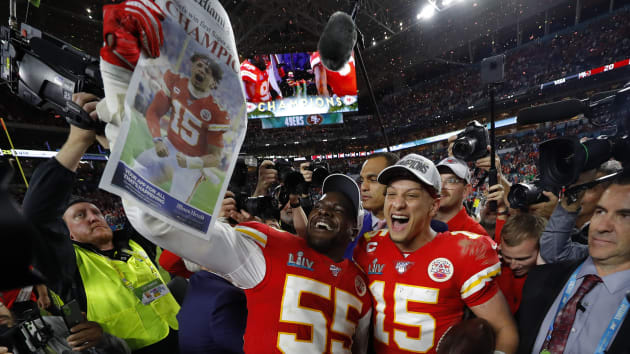
Kevin C. Cox/Getty Images
Finally, in the last season of the decade, the trend of offense over defense continued. Once again, neither the Kansas City Chiefs nor San Francisco 49ers were a top five defense statistically. The 49ers finished eighth and allowed 19.4 ppg, while the Chiefs finished seventh and allowed 19.3 ppg. However, offensively, both teams finished in the top five with the 49ers finishing second and the Chiefs finishing fifth. The 49ers averaged 29.9 ppg, and the Chiefs averaged 28.2 ppg. As neither team had a top-five defense the 2019 season cannot back up the adage.
In total, the decade backed up the saying “Offense sells tickets. Defense wins championships” only five times. The amount of times an elite defense won the Super Bowl was equal to the amount of times a non-elite defense won it all. As the rules continue to help the offenses, it is possible that the saying becomes extinct as offense becomes increasingly important. It will be interesting to see how football evolves in the next decade.
Joe Cammarota can be reached at joe.cammarota@student.shu.edu.




